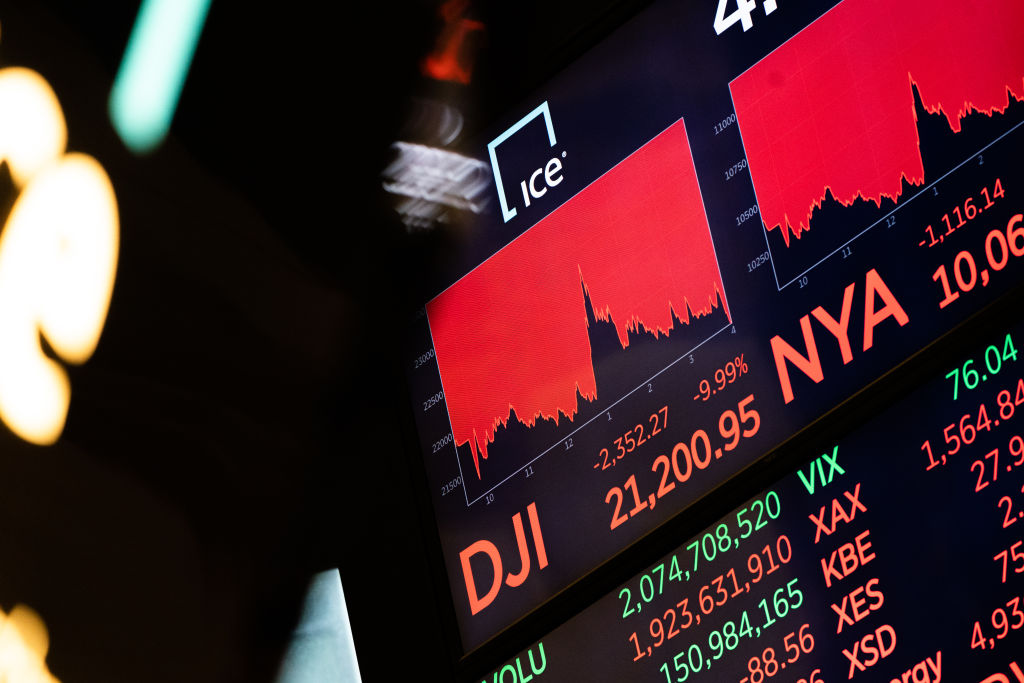Global markets in freefall as Trump adds to jitters
Investors are panicking about the economic impact of coronavirus - and the US response has exacerbated fears


A free daily email with the biggest news stories of the day – and the best features from TheWeek.com
You are now subscribed
Your newsletter sign-up was successful
US stocks fell by almost 10% on Thursday, concluding their worst day since 1987 and capping a day of global freefall. European markets also posted their worst one-day drop in history.
Central banks in the UK, Europe and US all took action, but they failed to reassure investors panicked by the coronavirus outbreak - and a speech on Wednesday night by Donald Trump, intended to calm nerves, instead deepened anxiety.
In his address, Trump announced a 30 day ban on Europeans travelling to the US, beginning today, and the news sent shock waves through the airline industry and wider economy, plunging markets into bear territory.
The Week
Escape your echo chamber. Get the facts behind the news, plus analysis from multiple perspectives.

Sign up for The Week's Free Newsletters
From our morning news briefing to a weekly Good News Newsletter, get the best of The Week delivered directly to your inbox.
From our morning news briefing to a weekly Good News Newsletter, get the best of The Week delivered directly to your inbox.
“This was the most expensive speech in history,” said Luca Paolini, chief strategist at Pictet Asset Management. “Investors are voting with their feet, and I can’t blame them.”
Despite the UK being spared the new travel restrictions - it applies only to the 26 members of the Schengen area - the FTSE 100 index was mired in losses, falling by nearly 11%, a loss of 639 points, marking its second-worst day of all time.
In London, as in the rest of the world, the damage was not limited to the travel industry. “Every single share fell, in a bigger wipeout than Monday’s slump,” says The Guardian.
Insurance giant Prudential and asset manager Standard Life Aberdeen both lost at least 16%, Cineworld shares fell by more than 20%, Barclays was down 17%, while mining giants Anglo American and Glencore shed 18% and 17% respectively. In the US, Morgan Stanley, Citigroup and Wells Fargo all lost around 15% of their value.
A free daily email with the biggest news stories of the day – and the best features from TheWeek.com
Oil prices, which have been falling steadily as Covid-19 hit demand, but crashed at the start of this week as a dispute between Russia and Saudi Arabia heralded an increase in supply, tumbled again - signalling that the US travel ban is expected to play havoc with the travel industry. Brent crude was down 7.2% at $33.22 a barrel.
Gregory Daco, chief US economist at Oxford Economics, also placed much of the blame with the US president.
“Markets reacted negatively to what was perceived as a solemn but confused speech that placed blame on other nations, omitted to focus on immediate actions to relieve the most affected individuals, and lacked in concrete fiscal and health measures to address the economic and financial impact of the virus,” he said.
–––––––––––––––––––––––––––––––For a round-up of the most important stories from around the world - and a concise, refreshing and balanced take on the week’s news agenda - try The Week magazine. Get your first six issues free–––––––––––––––––––––––––––––––
In response, Christine Lagarde said the European Central Bank would buy an additional €120bn (£107bn) in bonds before the end of the year, on top of their current €20bn (£18bn) per month, but this quantitative easing failed to reassure investors who had hoped she would also lower interest rates further from their record low of -0.5%.
Lagarde seemed to imply that the responsibility for keeping the Italian economy afloat lay with EU governments, not with the ECB, and within minutes of her speech, investors started fleeing from Italian bonds, concerned that the country, now in almost total lockdown, would not receove sufficient support.
“The week’s intense rout suggested investors were bracing themselves for a worst-case scenario,” says The Financial Times, “including a global recession, the lockdown of large urban centres and a severe credit crunch.”
“Markets are at a breaking point,” said Neil Wilson, chief market analyst at Markets.com. “No one knows what a total economic shutdown, however temporary, looks like.”
William Gritten is a London-born, New York-based strategist and writer focusing on politics and international affairs.
